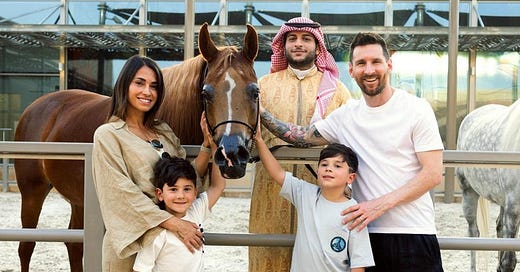Show Ponies
The fourth of my weekly short summaries about the culture and politics of football.
• In 1926, the Italian communist Antonio Gramsci wrote of class oppression by the north of Italy over their southern fellows. Gramsci also noted the ugly stereotypes that Northerners had of southerners. By coincidence, SSC Napoli was founded that same year. Two years after Gramsci wrote “Some aspects of the southern question,” Serie A, the first tier of the Italian football league system, played its first season and, not surprisingly, these stereotypes of the south found expression in the stands. When Napoli visited, rival fans sang of stinking, cholera-ridden Neapolitans. As Italy’s north industrialized and the south declined, northern teams dominated Serie A (Juventus, AC Milan, Inter Milan, AS Roma). It was only in 1970, that a southern club, Cagliari, won Serie A. As for Napoli, it enjoyed no success in Serie A (they did win a few cup competitions), until, in 1984, the club signed Diego Maradona, from FC Barcelona. Maradona, himself the subject of racist slurs back in his native Argentina, transformed Napoli through his leadership on the field and led Napoli to its first Serie A title in 1987. Maradona brought Napoli two more cups: the UEFA Cup in 1989, and Napoli’s second Serie A title in 1990. Maradona left Napoli in 1991, and though his life unraveled, Neapolitans turned Maradona into a god. Napoli never won the scudetto (how the Serie A title is known) again. That is until last week. Again, it was two adopted sons — the Georgian midfielder Khvicha Kvaratskhelia and the Nigerian forward Victor Osimhen — that inspired the team to its third Serie A title. For some, Kvaratskhelia is the reincarnation of Maradona; his nickname is “Kvaradona.” However, Osimhen, the working class boy from Lagos (he grew up next to a landfill) is the face and embodiment of this victory. It was fitting that he scored the goal (in a draw) that won Napoli the title. The city and Napoli’s fans has been celebrating ever since. Osimhen, who is also the top goalscorer in Italy this season, is now immortal in Napoli. This in a league and a country not very fond of black people. So it is fitting that it was Mario Balotelli who, Facetiming with Osimhen, helped his friend make sense of the occasion: “You still won’t know what you did. Trust me ... You will realize in 10 years what you did.”
• Not sure what to do with this news (per the Guardian): Joe Tacopina, Donald Trump’s lawyer in his recent civil trial for rape and defamation (a jury ruled Trump has to pay his accuser $5 million for defamation), is the owner and president of Spal football club, in Serie B, the second tier of the Italian football league system. He was previously briefly was president at Bologna, a part-owner of Venezia, and has shares in AS Roma, which plays in Seria A.
• Pitso Mosimane, (two African Champions League titles; 2 African Super Cups; two FIFA Club World Cup third places; and CAF Coach of the Year in 2016), still can’t find a job with any European club. Last week, Mosimane coached a Saudi second-division team, Al Ahly, to that country’s first division. The Saudi first-division features Cristiano Ronaldo at Al Hilal and, probably next year, Leo Messi.
• For a good account of Lionel Messi’s entanglement with the tourism arm of Saudi Arabia’s regime, I’d recommend Karim Zidan’s take. An excerpt:
… Messi’s decision to snub his Qatar-owned club [Paris Saint Germain] to fulfill his deal with Saudi Arabia does signal a shift in regional supremacy, at least when it comes to football. As Saudi continues to expand its influence in the world of sports and entertainment, its ongoing partnership with Messi – one of the most recognizable athletes in the world – is arguably among its most pivotal achievements.
• West Ham United and England midfielder Declan Rice knows he is big in Nigeria. (Nigerian Afrobeats artists making homages to their favorite footballers deserves a research project of its own.)
• Chris Bolsmann, the South African sociologist, has published a research article about the history of the hundreds of British players, coaches, and referees who visited, played and coached in South Africa — mostly in its whites-only leagues — after the introduction of apartheid in 1948, specifically between 1955 and 1983. This period was also the most repressive and racist in South Africa. Some of your favorites made the journey. Read it here.
• FC Barcelona Feminin is the 2022-2023 La Liga F champion. The team’s pre-eminent star is Nigerian international Asisat Oshoala (five times African Women’s Footballer of the Year). You can’t miss her: Oshoala stands out at the top of the women’s game, one which is very white and in which Europeans and Americans dominate. She scored the third goal in FC Barcelona’s title-clinching game, 3-0 vs Sporting Huelva. Barcelona is having an invincible season. It has scored 108 league goals and Oshoala scored 20, the leading scorer this season. At one point she had scored 3 hat tricks in 4 games.
• Sam Allardyce is back in the English Premier League, hired to coach Leeds United for four games and preventing them from relegation. He is a bad throwback coach. Everything that is bad about that. His main tactic is to prevent the opposition from scoring, he has backward and ignorant about the world and was partial to corruption. He also introduced Premier League fans to the genius of Jay Jay Okocha, ushering in, what Tony Karon calls, “Bolton’s Real Madrid phase.” To understand how much Jay Jay meant, Bolton, now in League One, the third tier of the English football league system, is still taking inspiration from tribute videos of his plays. As for Big Sam, Leeds United will most likely get regulated.
Follow me on Twitter.



